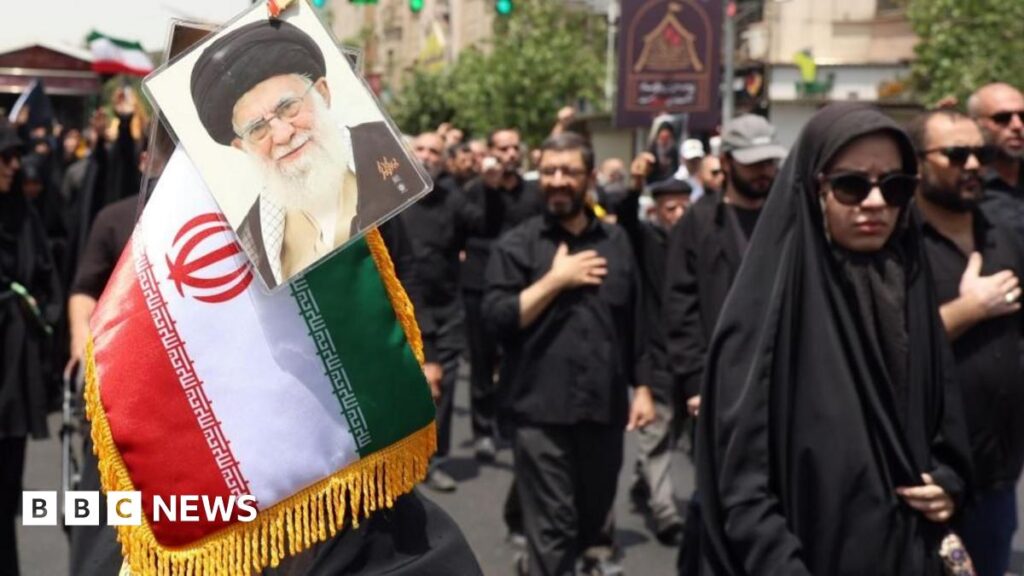Iran nuclear: UK, France and Germany move to reimpose UN sanctions
Published on August 28, 2025

The UK, France and Germany have begun the process of restoring major UN
sanctions on Iran – lifted under a 2015 deal – as tensions once again escalate
over Tehran’s nuclear programme.
The move will trigger a so-called snapback mechanism, which could result in the
return of sanctions in 30 days.
In a letter to the European Union’s policy chief, Iran’s foreign minister said
the three countries had “no legal jurisdiction” to reactivate the sanctions and
that both Russia and China supported Iran’s position.
The minister wrote that Iran was ready to resume “fair and balanced”
negotiations on the disputed programme if the other parties showed “seriousness
and goodwill”.
Participants in the 2015 deal, the three European nations warned two weeks ago
that they were prepared to restore the sanctions
unless Iran agreed to a “diplomatic solution” by the end of August.
Iran’s foreign ministry said the move would “seriously undermine” its ongoing
process with the International Atomic Energy Agency, calling it a “provocative
and unnecessary escalation” that “will be met with appropriate responses”.
Talks between Iran and the US over its nuclear programme have not resumed since
June when the US bombed Iranian nuclear sites and Iran barred UN-backed
inspectors from accessing its facilities.
Years-long crippling economic sanctions were lifted in exchange for curbs to
Iran’s nuclear programme under a UN-backed deal between Iran and the US, UK,
France, Germany, China and the EU.
But the deal unravelled after Donald Trump pulled the US out, calling it flawed
and re-imposing nuclear-related sanctions in 2018 during his first term. Iran
stepped up its nuclear activities in response, fuelling a renewed crisis.
The snapback provision was built into the 2015 accord and allows for a
participant to initiate the process to bring back sanctions if they believe Iran
has significantly failed to fulfil its nuclear commitments by notifying the UN
Security Council.
The UK, France and Germany, known as the E3, took the step in a letter to the
Security Council on Thursday. The council now has 30 days in which to decide
whether to continue sanctions relief or allow it to lapse.
The letter said Iran’s non-compliance with the 2015 nuclear deal was “clear and
deliberate”. It declared that Iran had “no civilian justification” for its high
enriched uranium stockpile – uranium purified to near military grade – and that
its nuclear programme “remains a clear threat to international peace and
security”.
The E3 said that during the next 30 days they would continue to engage with Iran
“on any serious diplomatic efforts to restore [its] compliance with its
commitments”.
British Foreign Secretary David Lammy said the UK and its European allies
recently offered an extension to sanctions relief, subject to Iran meeting
certain conditions.
But he added that Iran had made “no substantive effort” to meet these conditions
and “consistently failed to provide credible assurances on the nature of its
nuclear programme”.
Iran’s foreign ministry pushed back, saying it had demonstrated “its utmost
restraint and steadfast commitment” to diplomacy to preserve the previous deal
and find a negotiated solution.
Iran urged a rejection of the snapback provision, but said it remained ready to
engage with other members of the UN Security Council.
The US said it welcomed initiation of the snapback and would work with the E3 to
complete it.
“At the same time, the United States remains available for direct engagement
with Iran – in furtherance of a peaceful, enduring resolution to the Iran
nuclear issue,” a spokesperson for US Secretary of State Marco Rubio said.
Western powers and the global nuclear body the International Atomic Energy
Agency (IAEA) say they are not convinced that Iran’s nuclear programme has
purely peaceful purposes. Iran strongly insists it is not seeking nuclear
weapons, and that its nuclear programme is solely a civilian one.